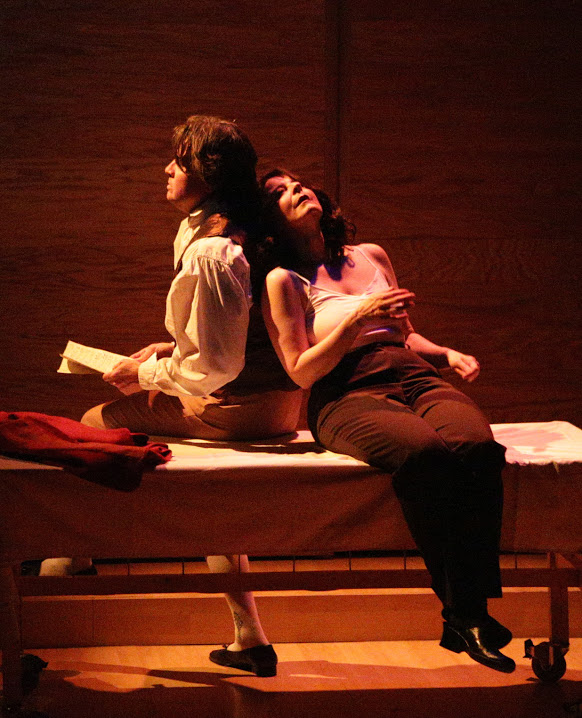“33 Variations” turns Beethoven piano masterpiece into affecting theater
For music fans and just about everybody else, Ludwig van Beethoven remains the archetype of the tortured artist, striving against physical infirmity to reach the stars.
Now compare his life and work to those of a present-day musicologist, racing against a fatal disease to discover the secret of one of Beethoven’s greatest compositions, the “Diabelli” Variations for piano, and you have the highly charged premise of Moisés Kaufman’s play 33 Variations, which is currently running at the Lyric Stage Company of Boston.
Written in 2007, 33 Variations was introduced that year at the Arena Stage in Washington, D.C. and had a limited run on Broadway during the spring of 2009, with Jane Fonda in the lead role. This production is its Boston premiere.
Directed by Spiro Veloudos with a capable cast of seven actors and one pianist, this ambitious production puts the monumental piano piece in counterpoint, the stage action set in the nineteenth and twenty-first centuries, with a dash of illustrated musicological lecture thrown in.
Kaufman has set the play’s action in brief scenes that he calls “variations”—33 in all, the same number as in the Beethoven work. At Sunday afternoon’s performance, the production’s many moving parts—actors acting, pianist playing, scenery panels sliding in and out, complex lighting cues interacting with projections of backdrops and titles and pages of music—seemed to work together well, although at times the busy, constantly shifting visuals threatened to overwhelm the actors, who one sensed could have carried the play quite well on their own.
As Dr. Katherine Brandt, the play’s central character, Paula Plum was superbly brisk and brainy and, as outfitted in smart blazer and florid scarf by costume designer Charles Schoonmaker, endowed with the ineffable sexiness of the über-nerd. She was also rather hopeless as a mom, a fact reflected in the countless little tensions between her and her bright but dreamy daughter Clara (in a knowing performance by Dakota Shepard). Plum’s depiction of Katherine’s gradual decline from the effects of ALS (Lou Gehrig’s disease) was utterly believable and heartbreaking.
The play’s other main character was, of course—no, not Beethoven, although he was present in an enigmatic way—the mighty piece itself, the 33 Variations on a Waltz by Diabelli. That role was “acted” by pianist Catherine Stornetta, a veteran musical director of Broadway shows who was dusting off her classical chops for this production.
No doubt Stornetta’s theatrical skills came in handy for a show that calls for the pianist to illustrate a lecture, comment on the action, or just slide in under dialogue like a film soundtrack, using bits and pieces of Beethoven’s kaleidoscopic score. One can hardly judge such a role as if it were a straight-through performance of the “Diabelli” on a recital stage, and maybe a classical pianist without theater experience couldn’t have pulled it off.
Still, in a town crawling with aspiring virtuosos, one wonders if director Veloudos should have settled for Stornetta’s workmanlike rendering of the music, when a more compelling interpretation of this important “character” might have been available. (It also would have helped if the piano had been exactly in tune on Sunday, not just “close enough for a play.”)
In general, playwright Kaufman did much better by his modern characters than his nineteenth-century ones, and there was a laugh or a tear around almost every bend in the present-day scenes. Kelby T. Akin as Mike, Katherine’s nurse who becomes Clara’s boyfriend, combined professional competence with an endearing tendency to put his foot in his mouth. Maureen Keiller found the wayward charm in Gertrude, the stereotypically chilly German archivist with a mischievous streak.
The script gave the actors in the old Vienna scenes less to work with. The drama there consisted mainly of complaints by the publisher-composer Diabelli to Beethoven’s friend and factotum (and future biographer) Anton Schindler that Beethoven was taking too long to finish the variations, with occasional blustery appearances by the master himself.
Still, a bright-eyed Victor L. Shopov made the most of the Leporello-like Schindler, and, as Diabelli, Will McGarrahan salvaged some dignity from the thankless role of straight-man-to-a-genius. As for the genius himself, Kaufman apparently couldn’t decide whether to write him as an unknowable mythic presence or a real person, and so fell somewhere in between, leaving actor James Andreassi—who startlingly resembled some portraits of Beethoven–to humanize the composer any way he could beyond the irascible outbursts the playwright wrote for him.
This character’s major set piece near the end of the show, in which Beethoven gives a bar-by-bar account of the “Diabelli”’s penultimate fugue while the pianist plays it, may have offered something less than a profound insight into the compositional process, but Andreassi’s impassioned monologue and Stornetta’s brave assault on the gnarly variation earned the performance’s only interruption by applause.
If Kaufman’s script tries too hard to mine dramatic suspense out of such long-settled questions as the contents of Beethoven’s sketchbooks or inaccuracies in Schindler’s biography, it plainly succeeds in conveying some of the intense pleasure of musical analysis and research.
For those who have never contemplated a Beethoven composition from the inside, this play, like Peter Shaffer’s 1979 Amadeus, will surely inspire awe and curiosity. And though it may contain few surprises for lovers of Beethoven’s music, 33 Variations holds the stage as a perceptive, and ultimately very moving, drama of human relationships and aspirations.
33 Variations plays through February 2 at the Lyric Stage Company of Boston, 140 Clarendon Street. lyricstage.com; 617-585-5678.
Posted in Performances





